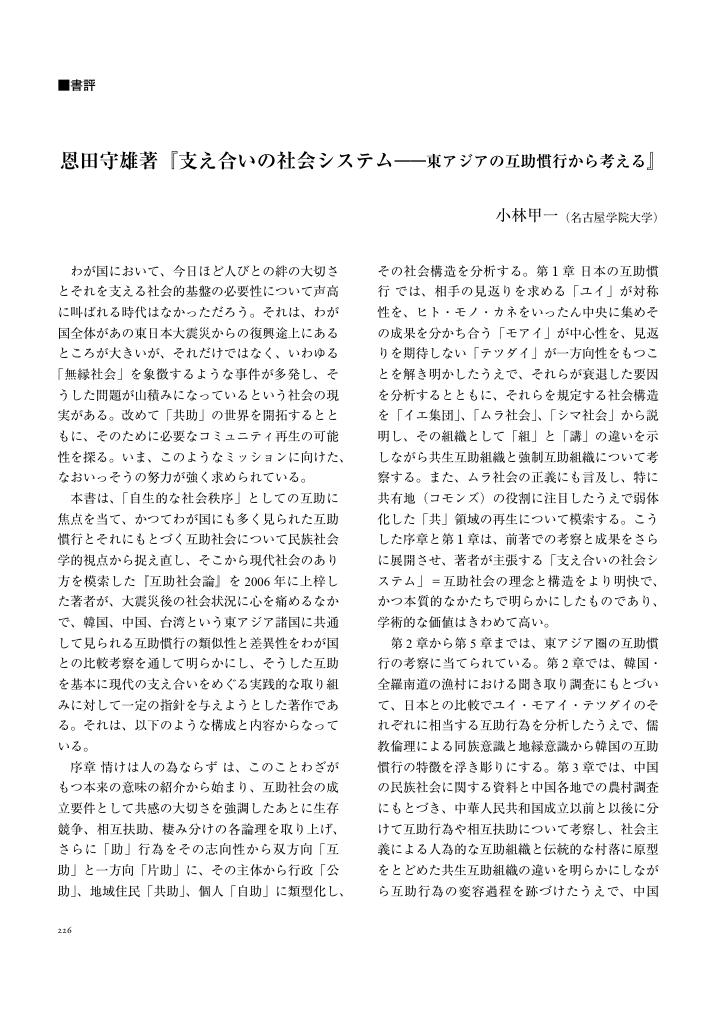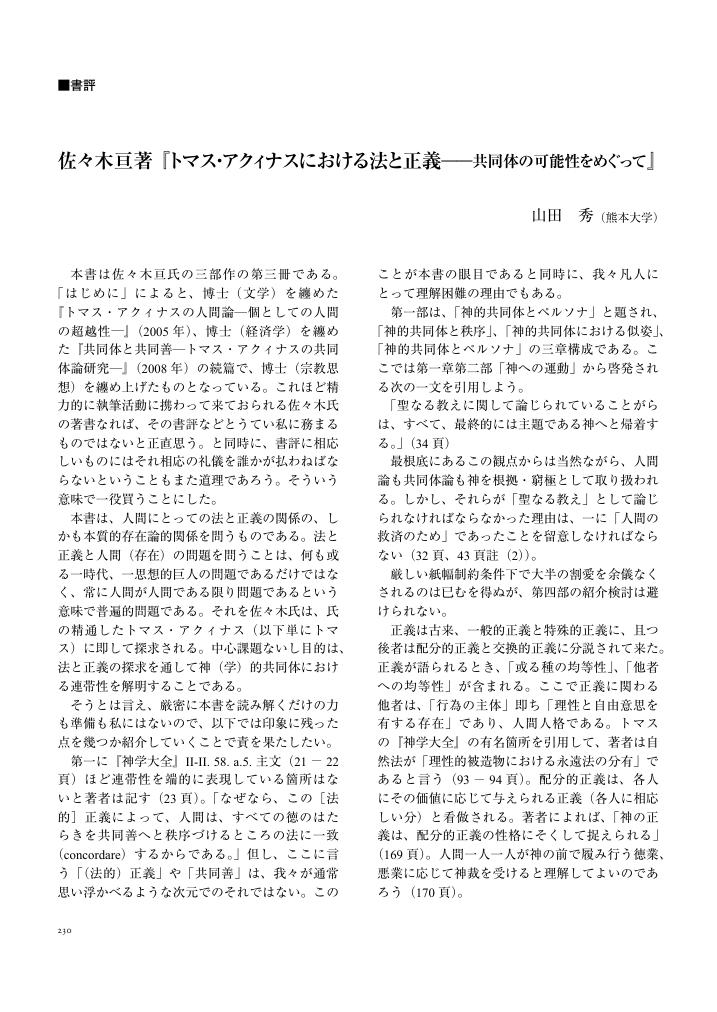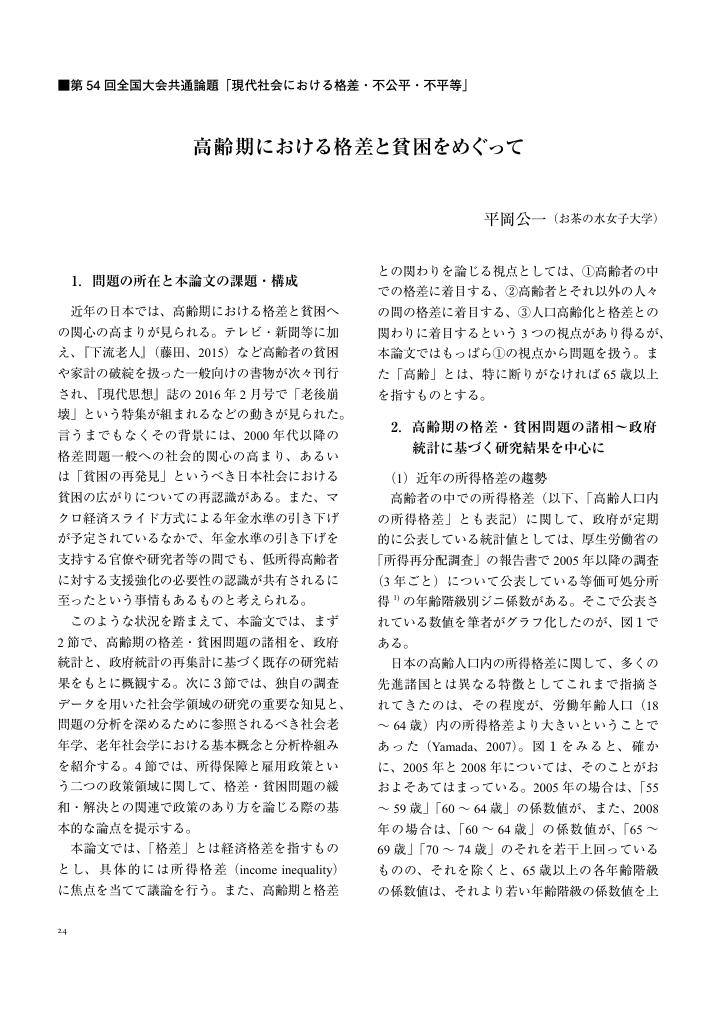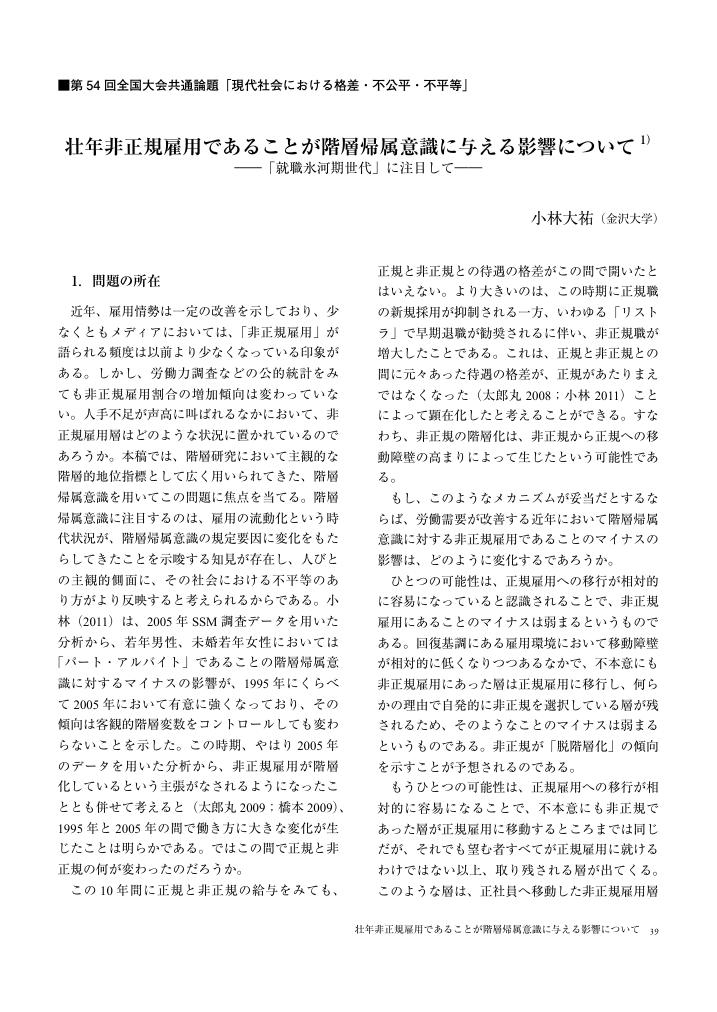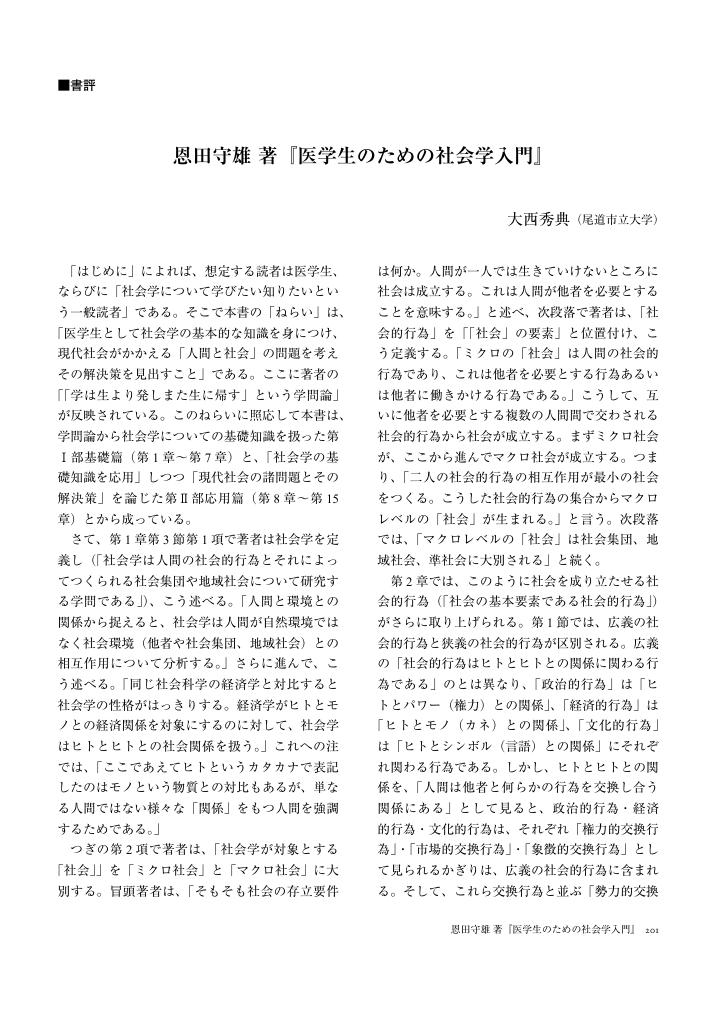1 0 0 0 OA 書評 藤岡真之 著『消費社会の変容と健康志向——脱物質主義と曖昧さ耐性』
- 著者
- 田中 人
- 出版者
- 経済社会学会
- 雑誌
- 経済社会学会年報 (ISSN:09183116)
- 巻号頁・発行日
- vol.41, pp.224-225, 2019 (Released:2021-09-10)
1 0 0 0 OA 書評 恩田守雄 著『支え合いの社会システム——東アジアの互助慣行から考える』
- 著者
- 小林 甲一
- 出版者
- 経済社会学会
- 雑誌
- 経済社会学会年報 (ISSN:09183116)
- 巻号頁・発行日
- vol.41, pp.226-227, 2019 (Released:2021-09-10)
1 0 0 0 OA 書評 百木漠 著『アーレントのマルクス——労働と全体主義』
- 著者
- 権 安理
- 出版者
- 経済社会学会
- 雑誌
- 経済社会学会年報 (ISSN:09183116)
- 巻号頁・発行日
- vol.41, pp.228-229, 2019 (Released:2021-09-10)
1 0 0 0 OA 書評 佐々木亘 著 『トマス・アクィナスにおける法と正義——共同体の可能性をめぐって』
- 著者
- 山田 秀
- 出版者
- 経済社会学会
- 雑誌
- 経済社会学会年報 (ISSN:09183116)
- 巻号頁・発行日
- vol.41, pp.230-231, 2019 (Released:2021-09-10)
1 0 0 0 OA 書評 神島裕子 著『正義とは何か——現代政治哲学の6つの視点』
- 著者
- 佐々木 亘
- 出版者
- 経済社会学会
- 雑誌
- 経済社会学会年報 (ISSN:09183116)
- 巻号頁・発行日
- vol.41, pp.232-233, 2019 (Released:2021-09-10)
1 0 0 0 OA 書評 十名直喜 著『現代産業論――ものづくりを活かす企業・社会・地域』
- 著者
- 永合 位行
- 出版者
- 経済社会学会
- 雑誌
- 経済社会学会年報 (ISSN:09183116)
- 巻号頁・発行日
- vol.40, pp.234-235, 2018 (Released:2021-04-01)
1 0 0 0 OA 消費研究の核心と経済社会学
- 著者
- 間々田 孝夫
- 出版者
- 経済社会学会
- 雑誌
- 経済社会学会年報 (ISSN:09183116)
- 巻号頁・発行日
- vol.41, pp.5-12, 2019 (Released:2021-05-10)
1 0 0 0 OA 「子どもの貧困」と「機会の平等」
- 著者
- 阿部 彩
- 出版者
- 経済社会学会
- 雑誌
- 経済社会学会年報 (ISSN:09183116)
- 巻号頁・発行日
- vol.41, pp.12-20, 2019 (Released:2021-05-10)
1 0 0 0 OA 高齢期における格差と貧困をめぐって
- 著者
- 平岡 公一
- 出版者
- 経済社会学会
- 雑誌
- 経済社会学会年報 (ISSN:09183116)
- 巻号頁・発行日
- vol.41, pp.24-35, 2019 (Released:2021-09-10)
1 0 0 0 OA 壮年非正規雇用であることが階層帰属意識に与える影響について 「就職氷河期世代」に注目して
- 著者
- 小林 大祐
- 出版者
- 経済社会学会
- 雑誌
- 経済社会学会年報 (ISSN:09183116)
- 巻号頁・発行日
- vol.41, pp.39-51, 2019 (Released:2021-09-10)
1 0 0 0 OA 精神障がい者小規模作業所運動の特徴と意義 支援者の行動変容プロセスの考察
- 著者
- 佐々木 秀夫
- 出版者
- 経済社会学会
- 雑誌
- 経済社会学会年報 (ISSN:09183116)
- 巻号頁・発行日
- vol.41, pp.110-120, 2019 (Released:2021-09-10)
Under the period of economic growth, Japanese government took an institutionalization based psychiatric medical treatment policy. In 1970s, when Japanese society had a strong prejudice to mental disabilities, the small-scale workshop activities started, and the number of the small- scale workshop for mental disabilities reached to more than 1700 in early 2000s. The activity greatly contributed the localization of the people with mental disabilities. The study focus to the pioneer generation who started the small-scale workshop activities with no subsidy and supporting system by the government, and try to clarify the unique points of the activity by the interview with 20 pioneer generation people. The data was acquired by the semi-structured styled interviews and was analyzed using the Modified Grounded Theory Approach. The result shows that the pioneer generation were voluntarily immersed in the activity by the deep understandings and empathy to the psychiatric disabilities and the conflict between pioneer generations and local residents, which drove the recursive and continuous cycle of the activities.
1 0 0 0 OA 意味ある仕事の分配論
- 著者
- 橋本 努
- 出版者
- 経済社会学会
- 雑誌
- 経済社会学会年報 (ISSN:09183116)
- 巻号頁・発行日
- vol.40, pp.58-67, 2018 (Released:2021-04-01)
The idea of liberalism, including Keynesian-type welfare state model, has not regarded “meaningful work” as a target of distribution. However, I would like to show a path to respond to this distribution problem of “meaningful work” from a liberal perspective. First, I shall point out that Marxists' ideas face some difficulties of the distribution of meaningful work. Second, I shall examine J. Rawls' and M. Walzer's responses to meaningful work distribution. Third, I shall raise my viewpoint of liberalism through examination of the concept of meaning. Last, I shall clarify policy implications of my standpoint. Through the above, I would like to show that a certain type of liberalism can propose how we can distribute “meaningful work.”
1 0 0 0 OA 自然法論におけるリーダーの使命 稲盛和夫の「フィロソフィ」と小倉昌男の「経営学」
- 著者
- 平手 賢治
- 出版者
- 経済社会学会
- 雑誌
- 経済社会学会年報 (ISSN:09183116)
- 巻号頁・発行日
- vol.40, pp.94-105, 2018 (Released:2021-04-01)
Building upon the renewal of business ethics form the perspective of Thomistic Natural Law Theory in the wake of “The Vocation of the Business Leader,” this essay offers a contemporary explanation of business leadership. The missions of business Leaders are to engage the global economic and financial world on the basis of human dignity and the common good, supported by the spirit of solidarity and the principle of subsidiarity. This reflection offers business leaders three practical principles, (1) the principle of meeting the needs of the world through the creation and development of goods and services, (2) the principle of organising good and productive work, (3) the principle of creating sustainable wealth and distributing it justly. The author confirms that these principles comport with the management theories of two entrepreneurs in Japan, Kazuo Inamori (1932- )who was a founder of KYOCERA Corporation and Masao Ogura (1924~2005)who created strategic system of door-to-door parcel delivery service, TAKYUBIN.
1 0 0 0 OA 他者と共同善 アクィナス正義論の現代的可能性
- 著者
- 佐々木 亘
- 出版者
- 経済社会学会
- 雑誌
- 経済社会学会年報 (ISSN:09183116)
- 巻号頁・発行日
- vol.40, pp.106-116, 2018 (Released:2021-04-01)
According to Thomas Aquinas, it is proper to justice, as compared with the other virtues, to direct man in his relations with others. And the relations with others may happen in two ways: first as regards his relation with individuals, and secondly as regards his relations with others in general. In the case of the latter, it is identified with the whole community, and it is evident to that community as parts to a whole. So others as individuals may be referable to others in general, and all acts of virtue can pertain to justice, in so far as it directs man to the common good. On the other hand, according to Martha C. Nussbaum, we need to face the issues of justice involved in our treatment of people with physical and mental impairments, of all world citizens, and of nonhuman animals. Her conclusion is not that we should reject Rawls's theory, but that we should keep working on alternative theories, that is, we should take a capabilities approach. The capabilities approach takes its start from the Aristotelian/Marxian conception of the human being as a social and political being, who finds fulfillment in relations with others. And the good of others is not just a constraint on this person's pursuit of her own good; it is a part of her good. In the expansion of the meaning of others and the common good, there may be the possibility of Aquinas’s theory of justice.
1 0 0 0 OA ダブルケア(育児と介護の同時進行)を行う者の経験世界の 構造と支援課題に関する一考察
- 著者
- 澤田 景子 伊東 眞理子
- 出版者
- 経済社会学会
- 雑誌
- 経済社会学会年報 (ISSN:09183116)
- 巻号頁・発行日
- vol.40, pp.129-140, 2018 (Released:2021-04-01)
The purpose of this study is to consider how to the requested support and issue by approaching the experience world of those who do double care. Therefore, a interview survey was conducted on six women in their 30's to 40's who do double care, after that continuous comparative analysis using qualitative coding was carried out. Based on the result of the survey, we made recommendations on the importance of (1) visiting type counselong support like accompanying, (2) a service provision system based on the eyes of family caregivers, (3) social understanding for double care.
1 0 0 0 OA 小学6年生の金融自己効力感とそれを規定する諸要因
- 著者
- 松川 誠一 関口 陽介 秋山 和子
- 出版者
- 経済社会学会
- 雑誌
- 経済社会学会年報 (ISSN:09183116)
- 巻号頁・発行日
- vol.40, pp.141-155, 2018 (Released:2021-04-01)
This study aims to explore the factors affecting the financial self-efficacy of children on the basis of the survey data of 910 sixth-graders. The variables to be examined concern parental involvement for children's financial socialization, conversation between parents and children, children's financial literacy and so forth. The OLS regression models are estimated by gender in order to clarify the gendered structure of financial socialization. The way in which parents give pocket money and the manner to manage pocket money have no statistical significance in neither male nor female models; parental disciplinary practices at financial behaviors have no impact on children's financial self-efficacy. While none of the types of conversations between parents and children is statistically significant in male models, female models show a significant figure only on the conversation about one's own career expectation. There exists gender difference in the influence of the degree of understanding of economic terms as well. In sum, the results suggest that financial socialization processes through which children's financial self-efficacy is facilitated have a different structure by gender under the influence of gender role consciousness in home environment.
1 0 0 0 OA 清潔志向と消費様式の安定化に関する実証分析 非消費主義の概念を手がかりとして
- 著者
- 鈴木 康治
- 出版者
- 経済社会学会
- 雑誌
- 経済社会学会年報 (ISSN:09183116)
- 巻号頁・発行日
- vol.40, pp.156-165, 2018 (Released:2021-04-01)
Consumer society has been discussed for a long time in the theoretical framework of a dichotomy between consumerism and anti-consumerism. Consumerism can be defined as personal mentalities and/or social trends actively pursuing quantitative expansion or qualitative sophistication of consumption activities. Now the existence of the third stance for consumption is pointed out theoretically. It is called non-consumerism, which is characterized by having the social effect to stabilize consumer lifestyle. The aim of this paper is to empirically demonstrate that cleanliness has some stabilizing effects on consumer lifestyle through estrangement from purchasing activities. So, in this regard, cleanliness can be viewed as one of the key factors carrying non-consumerism effects. The data from a survey of consumer life in the 21th century, which was conducted in the Tokyo area in 2016, was used for both a multiple regression analysis and a logistic regression analysis. The both analyses use two cleanliness scales called “organizing cleanliness” and “averting cleanliness” as explanatory variables. The result of analyses suggests that organizing cleanliness has certain, albeit limited, effects in stabilizing consumer lifestyle.
1 0 0 0 OA すでに起こった未来 自動車産業におけるコ・クリエーション
- 著者
- 阿部 孝太郎
- 出版者
- 経済社会学会
- 雑誌
- 経済社会学会年報 (ISSN:09183116)
- 巻号頁・発行日
- vol.40, pp.166-175, 2018 (Released:2021-04-01)
Franz (2005) pointed out that many average Americans modified the car as grass root inventor during 1915-1939. Kline and Pinch (1996) illustrated that American rural farmers modified model T as agricultural machine. After World War 2, so called “Tuner” modified the car and they won the champion in the races. The tuned cars had often beaten other cars including the car that original makers modified. And then, some companies began to collaborate with tuners. They could survive in the automobile industry, although almost other companies could not. As some researchers like von Hippel (1988, 2005) point out, these user innovations are critical in the industry. Many researchers and critics insist that in the near future average consumer can design and make the product with new technologies as well as professional companies do. But the history of car modifications demonstrates that average consumer lost the power of modification except simple custom like wheel exchange.
1 0 0 0 OA 「市民-消費者」としての倫理的消費者 社会貢献志向とクリエイティブ志向の効果の検討
- 著者
- 畑山 要介
- 出版者
- 経済社会学会
- 雑誌
- 経済社会学会年報 (ISSN:09183116)
- 巻号頁・発行日
- vol.40, pp.225-233, 2018 (Released:2021-04-01)
The aim of this paper is to clarify the profile of the ethical consumer as a “Citizen-consumer.” Those who bought eco-friendly or fair trade products were regarded as consumers who were motivated by social responsibility and political engagement. However, some studies show that such consumers are not necessarily ethical or political, but rather hedonistic and individualistic. This paper, therefore, focuses on “creativity” as an important factor of the ethical consumer. In order to examine what kinds of people purchase ethical products, we analyzed the fair trade consumer's motivation using quantitative data in Tokyo. The result of the analysis demonstrated that the younger ethical consumers tend to be associated with creative life, but without awareness of contribution to society. We can describe the younger ethical consumers as “Citizen-consumer” which pursue a good life for themselves.
1 0 0 0 OA 書評 恩田守雄 著『医学生のための社会学入門』
- 著者
- 大西 秀典
- 出版者
- 経済社会学会
- 雑誌
- 経済社会学会年報 (ISSN:09183116)
- 巻号頁・発行日
- vol.39, pp.201-202, 2017 (Released:2021-04-01)

